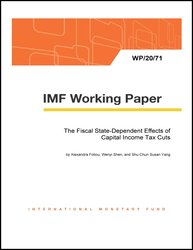
The Fiscal State-Dependent Effects of Capital Income Tax Cuts
The Fiscal State-Dependent E?ects of Capital Income Tax Cuts
READ MORE...
Volume/Issue:
Volume 2020
Issue 071
Publication date: May 2020
ISBN: 9781513545868
$18.00
Add to Cart by clicking price of the language and format you'd like to purchase
Available Languages and Formats
| English |
Prices in red indicate formats that are not yet available but are forthcoming.
Topics covered in this book
This title contains information about the following subjects.
Click on a subject if you would like to see other titles with the same subjects.
Economics- Macroeconomics , Public Finance , Taxation - General , WP , debt ratio , capital income tax effects , tax multiplier , fiscal policy effects , regime-switching models , non-linear DSGE model , income tax tax cut , income tax tax rate , cut effect , fiscal policy , rate data , tax revenue , capital income tax effect , cut increases government debt , output multiplier , Capital income tax , Fiscal consolidation , Corporate income tax , Consumption taxes
Summary
Using the post-WWII data of U.S. federal corporate income tax changes, within a Smooth Transition VAR, this paper finds that the output effect of capital income tax cuts is government debt-dependent: it is less expansionary when debt is high than when it is low. To explore the mechanisms that can drive this fiscal state-dependent tax effect, the paper uses a DSGE model with regime-switching fiscal policy and finds that a capital income tax cut is stimulative to the extent that it is unlikely to result in a future fiscal adjustment. As government debt increases to a sufficiently high level, the probability of future fiscal adjustments starts rising, and the expansionary effects of a capital income tax cut can diminish substantially, whether the expected adjustments are through a policy reversal or a consumption tax increase. Also, a capital income tax cut need not always have large revenue feedback effects as suggested in the literature.
Copyright © 2010 - 2026
Powered by:
AIDC



